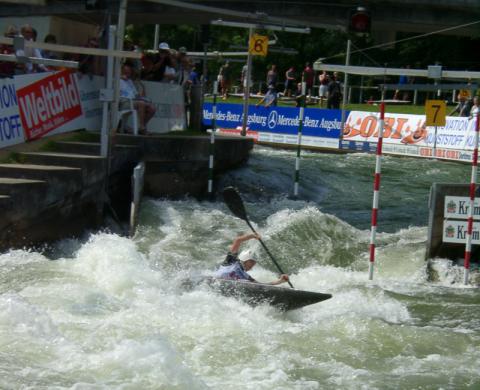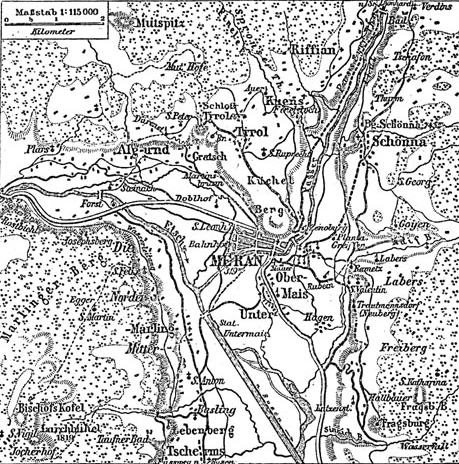|
Karl Bruns
Karl Bruns is a retired slalom canoeist who competed for West Germany in the mid-1950s. He won a bronze medal in the folding K-1 team event at the 1953 ICF Canoe Slalom World Championships in Meran Merano (, , ) or Meran () is a city and ''comune'' in South Tyrol, northern Italy. Generally best known for its spa resorts, it is located within a basin, surrounded by mountains standing up to above sea level, at the entrance to the Passeier .... References External links Karl BRUNSat CanoeSlalom.net German male canoeists Possibly living people Year of birth missing Medalists at the ICF Canoe Slalom World Championships {{Germany-canoe-bio-stub ... [...More Info...] [...Related Items...] OR: [Wikipedia] [Google] [Baidu] |
Kayaking
Kayaking is the use of a kayak for moving over water. It is distinguished from canoeing by the sitting position of the paddler and the number of blades on the paddle. A kayak is a low-to-the-water, canoe-like boat in which the paddler sits facing forward, legs in front, using a double-bladed paddle to pull front-to-back on one side and then the other in rotation. Most kayaks have closed decks, although sit-on-top and inflatable kayaks are growing in popularity as well. History Kayaks were created thousands of years ago by the Inuit, formerly known as Eskimos, of the northern Arctic regions. They used driftwood and sometimes the skeleton of whale, to construct the frame of the kayak, and animal skin, particularly seal skin was used to create the body. The main purpose for creating the kayak, which literally translates to "hunter's boat" was for hunting and fishing. The kayak's stealth capabilities allowed for the hunter to sneak up behind animals on the shoreline and successf ... [...More Info...] [...Related Items...] OR: [Wikipedia] [Google] [Baidu] |
Folding Kayak
A folding kayak is a direct descendant of the original Inuit kayak made of animal skins stretched over frames made from wood and bones. A modern folder has a collapsible frame made of some combination of wood, aluminium and plastic, and a skin made of a tough fabric with a waterproof coating. Many have integral air chambers inside the hull, making them virtually unsinkable. History First models The first workable folding kayak was built by Alfred Heurich in 1905, a German architectural student. Heurich paddled his creation on the Isar River near Munich and took out a patent on the design, called the Delphin (German: Dolphin), the following year. The Delphin had a bamboo frame with a sailcloth hull stretched over it. It could be folded up and carried in three bags, each weighing less than . The folding kayak was made commercially successful by Johannes Klepper, whose factory was at Rosenheim, Germany. Klepper kayaks were very popular for their compact size and ease of transpo ... [...More Info...] [...Related Items...] OR: [Wikipedia] [Google] [Baidu] |
Slalom Canoeing
Canoe slalom (previously known as whitewater slalom) is a competitive sport with the aim to navigate a Spraydeck, decked canoe or kayak through a course of hanging downstream or upstream gates on Whitewater, river rapids in the fastest time possible. It is one of the two kayak and canoeing disciplines at the Summer Olympics, and is referred to by the International Olympic Committee (IOC) as Canoe/Kayak Slalom. The other Olympic canoeing discipline is canoe racing, canoe sprint. Wildwater canoeing is a non-Olympic paddlesport. History Canoe slalom racing started in Switzerland in 1933, initially on a flatwater course. In 1946, the International Canoe Federation (ICF), which governs the sport, was formed. The first ICF Canoe Slalom World Championships, World Championships were held in 1949 ICF Canoe Slalom World Championships, 1949 in Switzerland. From 1949 to 1999 ICF Canoe Slalom World Championships, 1999, the championships were held every odd-numbered year and have been held ann ... [...More Info...] [...Related Items...] OR: [Wikipedia] [Google] [Baidu] |
ICF Canoe Slalom World Championships
The ICF Canoe Slalom World Championships are an international event in canoeing organized by the International Canoe Federation. The World Championships have taken place every year in non- Summer Olympic years since 2002. From 1949 to 1999, they had taken place in odd-numbered years. The 2001 championships were scheduled to take place in Ducktown, Tennessee (East of Chattanooga) from 20 to 23 September, but were canceled in the wake of the September 11 attacks. Men race in single kayaks (K1) and single canoes (C1) both individually and in teams. Women race in K1 both individually and in teams and since the 2010 championships also in C1 individually. A team event was scheduled for those championships, but it was canceled because of weather conditions. The first women's C1 team event took place at the 2011 world championships, but no medals were awarded. The first medals in this event were awarded in 2013. The men's C2 event was removed from the World Championships before the 20 ... [...More Info...] [...Related Items...] OR: [Wikipedia] [Google] [Baidu] |
1953 ICF Canoe Slalom World Championships
The 1953 ICF Canoe Slalom World Championships were held in Meran, Italy under the auspices of International Canoe Federation The International Canoe Federation (ICF) is the umbrella organization of all national canoe organizations worldwide. It is headquartered in Lausanne, Switzerland, and administers all aspects of canoe sport worldwide. 157 countries are affiliated .... It was the 3rd edition. Medal summary Men's Canoe Kayak Women's Kayak Medals table ReferencesResults * {{DEFAULTSORT:1953 Icf Canoe Slalom World Championships 1953 in Italian sport ICF Canoe Slalom World Championsh ... [...More Info...] [...Related Items...] OR: [Wikipedia] [Google] [Baidu] |
Canoe Slalom
Canoe slalom (previously known as whitewater slalom) is a competitive sport with the aim to navigate a decked canoe or kayak through a course of hanging downstream or upstream gates on river rapids in the fastest time possible. It is one of the two kayak and canoeing disciplines at the Summer Olympics, and is referred to by the International Olympic Committee (IOC) as Canoe/Kayak Slalom. The other Olympic canoeing discipline is canoe sprint. Wildwater canoeing is a non-Olympic paddlesport. History Canoe slalom racing started in Switzerland in 1933, initially on a flatwater course. In 1946, the International Canoe Federation (ICF), which governs the sport, was formed. The first World Championships were held in 1949 in Switzerland. From 1949 to 1999, the championships were held every odd-numbered year and have been held annually in non- Summer Olympic years since 2002. Folding kayaks were used from 1949 to 1963; and in the early 1960s, boats were made of fiberglass and nylon. ... [...More Info...] [...Related Items...] OR: [Wikipedia] [Google] [Baidu] |
Meran
Merano (, , ) or Meran () is a city and ''comune'' in South Tyrol, northern Italy. Generally best known for its spa resorts, it is located within a basin, surrounded by mountains standing up to above sea level, at the entrance to the Passeier Valley and the Vinschgau. In the past, the city has been a popular place of residence for several scientists, literary people, and artists, including Franz Kafka, Ezra Pound, Paul Lazarsfeld, and also Empress Elisabeth of Austria, who appreciated its mild climate. Name Both the Italian () and the German () names for the city are used in English. The Ladin form of the name is . The official name of the municipality (''comune'') is ''Comune di Merano'' in Italian and ''Stadtgemeinde Meran'' in German (both are in official use). History In 17th-century Latin, the city was called ''Meranum''. Other archaic names are ''Mairania'' (from 857 AD) and ''an der Meran'' (from the 15th century). Origin The area has been inhabited since the thir ... [...More Info...] [...Related Items...] OR: [Wikipedia] [Google] [Baidu] |
German Male Canoeists
German(s) may refer to: * Germany (of or related to) **Germania (historical use) * Germans, citizens of Germany, people of German ancestry, or native speakers of the German language ** For citizens of Germany, see also German nationality law **Germanic peoples (Roman times) * German language **any of the Germanic languages * German cuisine, traditional foods of Germany People * German (given name) * German (surname) * Germán, a Spanish name Places * German (parish), Isle of Man * German, Albania, or Gërmej * German, Bulgaria * German, Iran * German, North Macedonia * German, New York, U.S. * Agios Germanos, Greece Other uses * German (mythology), a South Slavic mythological being * Germans (band), a Canadian rock band * "German" (song), a 2019 song by No Money Enterprise * ''The German'', a 2008 short film * "The Germans", an episode of ''Fawlty Towers'' * ''The German'', a nickname for Congolese rebel André Kisase Ngandu See also * Germanic (other) * Germa ... [...More Info...] [...Related Items...] OR: [Wikipedia] [Google] [Baidu] |
Possibly Living People
Possibility is the condition or fact of being possible. Latin origins of the word hint at ability. Possibility may refer to: * Probability, the measure of the likelihood that an event will occur * Epistemic possibility, a topic in philosophy and modal logic * Possibility theory, a mathematical theory for dealing with certain types of uncertainty and is an alternative to probability theory * Subjunctive possibility, (also called alethic possibility) is a form of modality studied in modal logic. ** Logical possibility, a proposition that will depend on the system of logic being considered, rather than on the violation of any single rule * Possible world, a complete and consistent way the world is or could have been Other *Possible (Italy), a political party in Italy *Possible Peru, a political party in Peru *Possible Peru Alliance, an electoral alliance in Peru Entertainment *'' Kim Possible'', a US children's TV series :*Kim Possible (character), the central character of ... [...More Info...] [...Related Items...] OR: [Wikipedia] [Google] [Baidu] |
Year Of Birth Missing
A year or annus is the orbital period of a planetary body, for example, the Earth, moving in its orbit around the Sun. Due to the Earth's axial tilt, the course of a year sees the passing of the seasons, marked by change in weather, the hours of daylight, and, consequently, vegetation and soil fertility. In temperate and subpolar regions around the planet, four seasons are generally recognized: spring, summer, autumn and winter. In tropical and subtropical regions, several geographical sectors do not present defined seasons; but in the seasonal tropics, the annual wet and dry seasons are recognized and tracked. A calendar year is an approximation of the number of days of the Earth's orbital period, as counted in a given calendar. The Gregorian calendar, or modern calendar, presents its calendar year to be either a common year of 365 days or a leap year of 366 days, as do the Julian calendars. For the Gregorian calendar, the average length of the calendar year (the mea ... [...More Info...] [...Related Items...] OR: [Wikipedia] [Google] [Baidu] |
.jpg)





